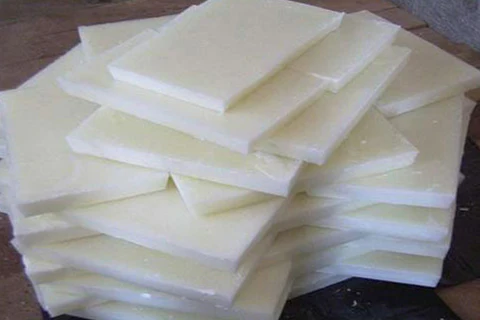Other
Paraffin Wax Vs Soy Wax – Who is the Winner?
If you look at the labels on the candles in your house, you’ll find that some are made of paraffin wax, and others are made of soy wax–and you might question if there’s a significant difference between the two. While they are both popular candle waxes, the differences between them are significant, which is why people utilize them for candle manufacturing worldwide.

The candle aisle may be daunting or dream-like, depending on who you ask. In any case, understanding what’s in the candle and how it affects the surroundings allows for a more enjoyable and serene candle purchasing experience. There has long been a controversy between soy wax candles and paraffin wax candles. So we’re here to delve in and learn about both of them Paraffin Wax Vs Soy Wax.
What is Paraffin Wax?
Paraffin wax is a byproduct of the manufacture of gasoline and crude oil. It is commonly used in the manufacture of traditional candles. The availability of a paraffin candle is its major redeeming quality. Although they have been around for a longer time, they are more well-known in stores. Many businesses use them despite containing dangerous substances.

Synthetic scents and artificial colors may readily gel with paraffin. Because semi refined paraffin wax candles are readily available, they are less expensive to produce. They perform the job and provide the ambiance you seek, but the trade-offs include unsavory components that emit hazardous gases and have a bad influence on the environment.
What is Soy Wax?
Soy wax is a vegetable byproduct that helps to reduce waste and avoid the release of harmful chemicals. Soybeans are biodegradable and a renewable resource, lessening their environmental effect. Soy wax candles have a lower environmental impact than conventional candle waxes, including paraffin.

There are several advantages to the components and performance of soy wax flakes, ranging from the avoidance of hazardous compounds to its burn time. Because they are a clean-burning fuel source, soy wax satisfies numerous standards under federal rules that identify it as clean-burning. This wax is colorless and often seems impenetrable.
Difference Between Paraffin Wax and Soy Wax – Factors
The distinctions between soy wax vs paraffin wax range from how the candles burn to their environmental impact. So, let’s compare paraffin vs. soy wax to see which is the best wax for burning candles in your house.
1. Sourcing/Availability
Soy wax is derived from soybeans, whereas paraffin wax is derived from petroleum (the same petroleum used to make oil and gas). Soy wax, a hydrogenated version of soybean oil, was developed in 1991 as an alternative to paraffin wax. Soy wax is completely natural, but it is also sustainable since we can cultivate more soybeans.
Paraffin wax, discovered in 1850, is produced by extracting the waxy ingredient from crude oil. Because fossil resources cannot be replenished, paraffin wax is unsustainable. All of the main candle sellers carry one or both soy and paraffin wax kinds. However, soy wax can be more difficult to get. Paraffin appears to be quite easy to get in most nations; therefore, it receives a minor nod in terms of availability.
2. Nature Derived
Vegetable soybeans are used to make soy wax candles. It employs the hydrogenation process, transforming the soybean into a solution that solidifies at normal temperature. Though the methods vary based on the company, the process begins the same for everyone.
Unlike soy wax candles, paraffin wax is derived from petroleum. It is a waste product of fossil fuels that must be extracted from the earth. This is the same petroleum that is used to make oil and gas. Yes, you might be using fossil fuels in your own house! If you attempt to live a more environmentally friendly lifestyle, paraffin wax candles may not be for you.
3. Soot Emission
Because soy wax is manufactured from soybeans, it is environmentally beneficial because soybeans are a renewable resource. Soy candles emit no petro-soot as compared to paraffin candles. Lower soot levels aid in preserving clean air quality and reducing house maintenance issues related to soot deposits. Soy wax has enabled people to use clean-burning candles derived from renewable sources.
Petroleum, which is not a renewable resource, is used to make paraffin wax. This is especially crucial if you are pregnant, have children, or have pets, since it is the healthiest option. You should avoid burning candles made from these wax because they do not burn completely. In addition, the soot of this wax includes a number of carcinogenic chemicals, a cancer-causing substance.
4. Toxicity
Since soy wax is created entirely of natural components, it is believed to burn cleaner than petroleum-derived paraffin wax. People sometimes complain of headaches when paraffin candles burn, although this is usually due to the chemicals released into the air rather than the aroma of the wax.
Many popular candle brands use paraffin wax to produce their candles. However, it has been stated that when paraffin wax is burned, toxic compounds are released, which has led to its downfall. According to research, burning paraffin wax candles emits benzene, a chemical that promotes cancer formation.
5. Burning Time
If all other factors remain constant, soy wax will burn 30 to 50 percent longer than a paraffin candle. Again, this is determined by the candle’s height and width, as well as the length of the wick and other considerations. The wax may overheat if you burn the candle for more than four hours. Keep the candle away from draughts, and relight it if the wick moves while the wax melts.
6. Melting Point
Soy wax has a lower melting point, making it simpler to burn in cooler surroundings or during colder seasons such as winter. This lower melting point also reduces your chances of inadvertently burning oneself if the candle is pushed over or there is an accident. If you reside in an extremely hot place where temperatures reach the lower end of that range, soy wax can melt on its own.
Paraffin wax has a higher melting point, ranging from 120 to 160°F (49 to 71°C), due to its massive, defined crystal structure. Because of its crystal structure, paraffin wax is harder and brittle, whereas soy wax is softer and more malleable.
7. Scent Throw
Many individuals believe that the more fragrance oil a wax can store, the greater the aroma throw. This isn’t always the case because the type of wax you use has a significant impact on smell. Soy is denser than paraffin at the molecular level. Because soy is denser, it takes more heat to burn it up, making it take longer for the scent to be released. As the wax melts, the heat from the flame vaporizes it, releasing the fragrance oil into the air.
When comparing the aroma throw of a paraffin candle to that of a soy candle, the scent throw of the paraffin candle is generally stronger. This is because paraffin burns more easily, and for that reason, the fragrance released from this wax disperses off more easily, making the aroma throw greater or more pervasive.
8. Price
Soy wax, as the name implies, is derived from soybeans. Because beeswax is so costly, candle makers sought a less expensive natural replacement. Soy wax is regarded as a natural alternative to paraffin and a less expensive alternative to beeswax.
Because of its low cost, paraffin is perhaps the most popular substance for mass-market candles. However, only lately has extensive study revealed that the low cost comes with a slew of negative consequences for your health and the environment.
Is Soy Wax Better Than Paraffin Wax?
If you value sustainability and high quality, soy is the perfect wax for candles in your house. It burns cleaner, has a richer smell, and is more environmentally friendly for you and the environment. What more could you want? So, the next time you buy a candle, read the label. You deserve the finest for your family, and soy wax candles are the greatest option.

